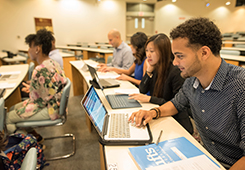
Psychological First Aid: Resources for Faculty in Higher Education
by Dana Grossman Leeman, Provost Faculty Fellow for Online Education at Simmons
Working with students who are actively struggling with depression and anxiety will inevitably impact their ability to be present and engaged. Keep in mind that difficulty focusing and taking in new information can be a symptom of both disorders.
- Please be compassionate and curious about what your students need.
- Please do not be intrusive. The main message is, “what do you need and how can I support you so you can be successful in this course?”
- Please add a statement about mental health in your syllabi, and what you have in place for students who may need accommodations due to activated mental health challenges. This sets a compassionate tone and lets students know that you are aware that this is common, and you are approachable and compassionate.
It may ultimately come to the student dropping a course or taking a leave from the university. The main function of faculty is to connect students to the appropriate clinical supports at the university:
- Know the symptoms and how they manifest in the classroom.
- You are an educator, not a therapist. It is not helpful to students if faculty bend boundaries and take on a therapist-like role. You are a conduit to appropriate supports. Saying to a student, “I really care about you and what you are going through, so let’s think through who can be helpful.” Affirm their pain and struggle. DON’T try to fix it. This is not safe for either of you.
- Please complete Kognito training. It’s well worth your time and a very valuable resource.
Additional Mental Health Resources
Mental health challenges require urgent response
4 ways faculty can be allies for college student mental health
COVID-19’s psychological toll in higher ed
Image credit: Tufts University Memorial Steps seen from College Avenue (Alonso Nichols/Tufts University)


